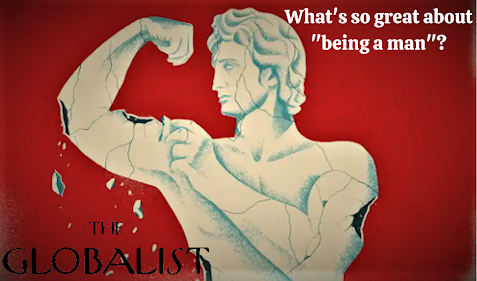Column | What's So Great About "Being a Man"?
"Toughen Up."
"Why don't you grow a pair?"
We have a million different ways of telling men that to actually 'be men', they need to have this '56-inch chest'.
But where does this idea come from?
Researchers have found that humans evolved as a gender-equal species. In hunter gatherer societies, men and women had different but equal roles. Both found food, raised children, and made decisions for the family, and community. Around 10-12,000 years ago, the invention of agriculture changed that. When humans settled on particular parcels of land and began accumulating resources, they needed to defend their homesteads from other humans. As a result, the emphasis on physical strength increased, and those communities with the physically strongest men became the most powerful and prosperous.
Through the centuries, the importance of men physically protecting their societies grew stronger, especially as warfare became central to societies and nation States. But in the 19th century, this notion of Manliness shifted in the Victorian era, as economies focused more on industry.
Men were supposed to be tough to manage grueling work schedules, while women were supposed to be patient to manage family life in the household. This Victorian idea of masculinity impacted how we viewed men in India. During colonial rule, Britishers frequently ridiculed the muscularity of Indian men, describing them as effeminate and weak.
Indian men's lack of manly characteristics in their perception, was often used as a justification for the more courageous, genetically superior Brits to rule over them, and so for men in the Indian subcontinent, the emphasis on physical strength and virility became intertwined with national pride and defeating colonial tyranny. Even after independence, this idea remained strong.
It was evinced in the Hindi cinema through the trope of the nationalist hero of the 50s and 60s, who used his hard-raked money to carry the burden of the newly liberated country.
By the 70s, as people became disillusioned by dint of the corruption of the Indian government, this tough guy trope was reinforced of the angry young man who was fighting an unfair system. In the 90s and early 2000s, box office numbers have shown that the biggest hits throughout the years have still been the brawling, aggressive action flicks, with the typical macho hero, his curdling blood, and his savior complex.
In our everyday lives, the pressure on men to be 'tough' starts as early as school and College, when boys are encouraged to become a firebrand of physical toughness through sports and other outdoor activities. Later, they are coaxed to pursue manly fields- engineering, while the creative pursuits are left to women. Thereupon, the society only reinforces what it means to behave Manly. For instance, studies have found that men are perceived to be of a lower status or less competent if they express emotions such as sadness, display vulnerability, or ask for help.
Psychologists link this social conditioning to pent up anger, displays of violence, depression, and even higher rates of suicide among men. So if this notion of being a mard (Man) causes so much dard (Pain) [A Hindi Pun]. Why do we hold onto it so tightly?
It's time we stop viewing tough men as superior and rethink what toughness itself means.
Going through childbirth is tough. Standing up to a system that rejects your sexuality is tough. It's tough to do paid work for the sake of supporting your family, but it's equally tough to do unpaid work that goes unacknowledged.
So let's not assume there's only one way to be tough or strong or the pillar of support for a community, instead, it might be healthier to admit that strength appears in various ways. And the strongest among us are those who accept that diversity and don't define strength as per gender stereotypes.


Even I wonder why. ...
ReplyDeleteMust read
Tough questions asked....
ReplyDeleteMust say Radically empathetic yet straight as an arrow..
This is what we need
Critical, persuasive arguments....Wonderful ending
ReplyDeleteI love this!!
ReplyDeleteNothing but the unadulterated truth...!!
Youth for the Truth, a truth that is highly unpalatable but one that must be told...Good work!
ReplyDeleteIg ya're qualified enuf to call urself a journalist
ReplyDeletewowowowowowowowowowowo
ReplyDeleteagreed, but we want to see the globalists editor-in chief speaking:)
ReplyDeleteAlbeit I disagree a little, I find this one interesting
ReplyDeleteUhm man's
ReplyDeletenice nice nice
ReplyDelete